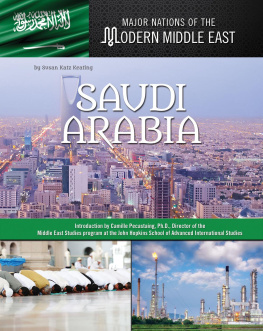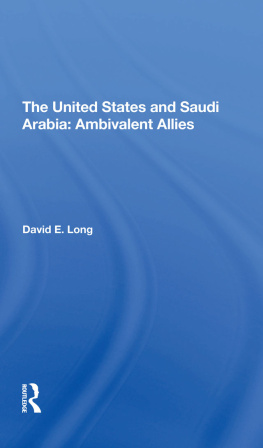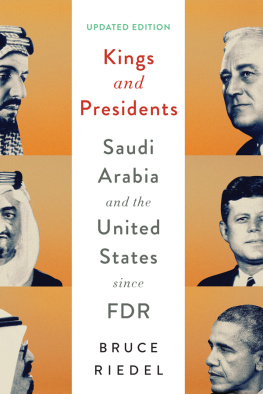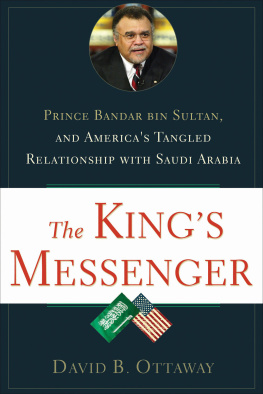Kings and Presidents
Saudi Arabia and the United States since FDR
BRUCE RIEDEL
BROOKINGS INSTITUTION PRESS
Washington, D.C.
Copyright 2018
THE BROOKINGS INSTITUTION
1775 Massachusetts Avenue, N.W., Washington, D.C. 20036
www.brookings.edu
All rights reserved. No part of this publication may be reproduced or transmitted in any form or by any means without permission in writing from the Brookings Institution Press.
The Brookings Institution is a private nonprofit organization devoted to research, education, and publication on important issues of domestic and foreign policy. Its principal purpose is to bring the highest quality independent research and analysis to bear on current and emerging policy problems. Interpretations or conclusions in Brookings publications should be understood to be solely those of the authors.
Library of Congress Cataloging-in-Publication data are available.
ISBN 978-0-8157-3137-5 (cloth : alk. paper)
ISBN 978-0-8157-3138-2 (ebook)
9 8 7 6 5 4 3 2 1
Typeset in Fournier MT
Composition by Westchester Publishing Services
To Gloria
Contents
Prologue
I t was a bitterly cold day in December 2001. The terrible tragedy of September 11 was still fresh in our minds. The attack on America by al Qaeda had stunned the world. It had also created a crisis in Americas relations with its oldest ally in the Middle East and the Islamic World. Fifteen of the nineteen terrorists were Saudi citizens and the leader of al Qaeda was another Saudi, Osama bin Laden. Indeed, bin Laden had wanted to create a crisis between Americans and Saudis and deliberately chose his countrymen to attack the World Trade Center, the Pentagon, and the Capitol to damage the relationship.
My wife, Elizabeth, and I were going to the Virginia residence of the Saudi ambassador to the United States, His Royal Highness Prince Bandar bin Sultan bin Abdul Aziz, for lunch. I was leaving the White House after almost five years on the National Security Council staff under Presidents Bill Clinton and George Bush for another assignment with the Central Intelligence Agency. For more than a decade I had worked closely with Prince Bandar, and he wanted to host us for a farewell lunch. His wife Haifa bint Faisal, the daughter of the former king of Saudi Arabia, was joining us.
The son of the late crown prince Sultan bin Abdul Aziz al Saud, Bandar is a graduate of the Royal Air Force College in Cranwell in the United Kingdom. Bandar later received additional military training in the United States and a masters degree from the Johns Hopkins University School for Advanced International Studies (as did Elizabeth). King Fahd appointed him defense attach to the United States in 1982 and then ambassador in October 1983. He served in that post until 2005; his twenty-two years in office were longer than any other current ambassador, and this made him the dean of the diplomatic corps in Washington.
His skills as a diplomat, conspirator, and spymaster are legendary. A colleague of mine called Bandar the greatest show in Washington for his ability to insinuate himself into American decisionmaking and to influence American foreign policy toward policies that the Kingdom wanted. He worked with five American presidents, ten secretaries of state, and eleven national security advisers during his two decades as the kings man in Washington. The king provided him with his own four-engine wide-bodied Airbus 3000, fitted out with three bedrooms and a lounge so the ambassador could travel quickly and in comfort around the world.
Of course Bandar also had his setbacks and detractors. A plane accident during his Royal Saudi Air Force flying days left him with chronic back pain, which often led to lengthy rehabilitation absences from his job. He sometimes exaggerated his ability to influence his bosss thinking and over-reached beyond his brief. Even his critics admitted, however, that he was a major player both in Washington and Riyadh.
Our lunch was served in a small room in the residence decorated to remember the Battle of Britain, the RAFs historic victory over the Luftwaffe in 1940 that saved England from Nazi invasion. Much of our lunch was a social occasion. Over more than a decade I had spent considerable time with Bandar at his homes in America, England, Switzerland, and in the Saudi kingdom. We had dined on fine meals at luxury restaurants as well as on McDonalds Big Macs, a shared passion, in his residence and at the Saudi embassy. I briefed him in August 1990 on the Iraqi threat after the invasion of Kuwait, shared meetings with three presidents and two Saudi monarchs together, and even stood by him to help explain to his father, then Defense Minister Prince Sultan, why a Saudi conspiracy to divide Yemen had failed. Bandar had sent flowers to celebrate our wedding and had attended a party after it, so we had had previous social encounters. He wanted to wish Elizabeth and me well in our next assignment in London.
Bandar is a great storyteller. He regaled us with one story about a trip he and Haifa took to a spa in England a few years earlier to detoxify their systems with healthy food and country air. After a few days of the regime, Haifa and Bandar slipped out one night to the local Chinese restaurant and indulged in a food binge. They both giggled like teenagers at the memory of their little adventure.
But inevitably work and 9/11 came into the conversation. Bandar was highly agitated that his years of trying to bring the Kingdom and America together as allies were jeopardized by al Qaedas murderous attack. Bandar had spent his life seeking to persuade Americans, especially American presidents, that the Kingdom is Americas most reliable and influential ally in the Islamic worldan ally that could deliver on issues ranging from fighting the Soviet Union in Afghanistan in the 1980s; stopping Saddams aggression in Kuwait in the 1990s; and helping make peace between Arabs and Israelis over many decades to ensuring the reliable and affordable supply of oil to the world market.
Bin Ladens attack on America jeopardized all of Bandars work. Instead of an ally, the Kingdom suddenly appeared to many Americans as an enemy. Saudi Arabia was increasingly portrayed in the American media as a hothouse of terrorism, an extremist Islamic state that provided the ideological base for al Qaeda, and a fertile recruiting ground for terrorists. The Kingdoms many enemies were quick to jump on the bandwagon of Saudi phobia. A prominent Israeli author, for example, quickly wrote a book titled Hatreds Kingdom: How Saudi Arabia Supports the New Global Terrorism . A former CIA officer wrote another, Sleeping with the Devil: How Washington Sold Our Soul for Saudi Crude . There were demands that Washington investigate the Saudi role in allegedly sponsoring al Qaeda in general and to determine what role it played in the 9/11 conspiracy itself. Haifa, Bandars wife, was even accused of helping to finance the plot.
Bandar found himself accused of being the enemy. A man who had spent decades working with America in the Oval Office, a super fan of Americas team, the Dallas Cowboys, and a generous supporter of many humanitarian causes in the United States, now was suspected of being secretly in bed with Americas worst enemy.
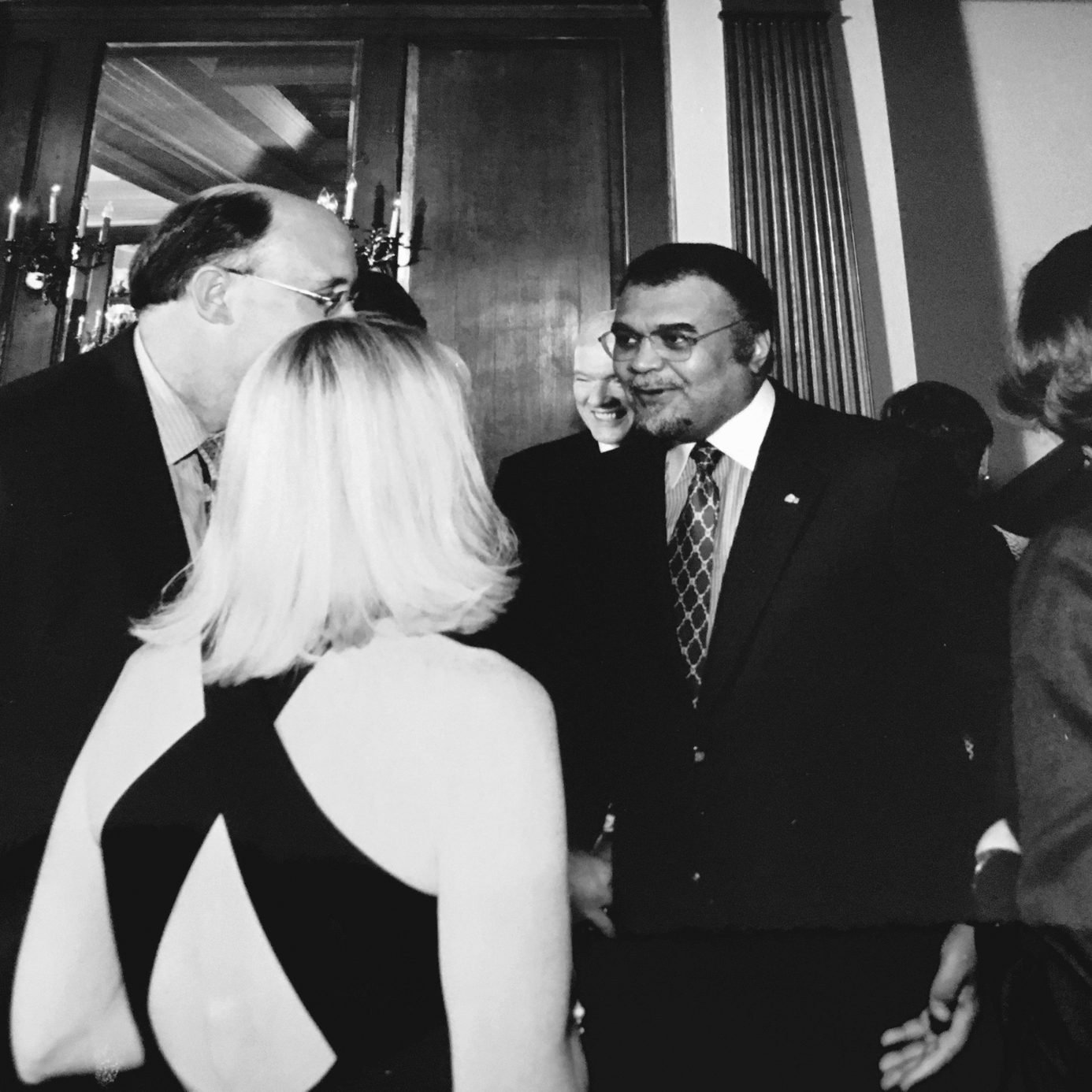
Ambassador Prince Bandar bin Sultan greeting the author and his wife, September 8, 2001, just days before the events of 9/11. (Authors collection)
All this was especially painful for Bandar because just days before 9/11 he had appeared to have helped resolve a falling out between his boss Crown
Next page

